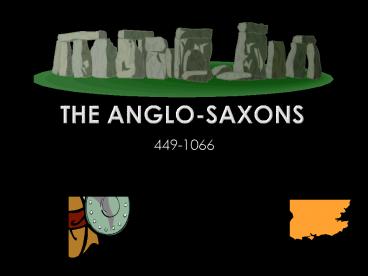The Anglo-Saxons - PowerPoint PPT Presentation
1 / 23
Title:
The Anglo-Saxons
Description:
449-1066 Invaded by Iberians (came from Iberian Peninsula) Celts Romans Anglo Saxons Vikings Normans These invasions shaped the country Known to be in England since ... – PowerPoint PPT presentation
Number of Views:479
Avg rating:3.0/5.0
Title: The Anglo-Saxons
1
The Anglo-Saxons
- 449-1066
2
Great Britain
- Invaded by
- Iberians (came from Iberian Peninsula)
- Celts
- Romans
- Anglo Saxons
- Vikings
- Normans
- These invasions shaped the country
3
Celts
- Known to be in England since 300 B.C.
- 700 B.C. they dominated western and central
Europe - Artisans introduced iron to the rest of Europe
- Farmers
- Warriors
- Language was dominant until 500 A.D.
- Language was the basis for
- Scots Gaelic, Welsh, Irish (Wales, Scotland,
Ireland)
4
Celts
- One of the groups of Celts, Brythons, formed the
basis for the name Britain - The legend of King Arthur was based on Celtic
legends about one of their Chieftains - William Butler Yeats used Celtic legends as basis
for his poetry - Celtic legends included strong powerful women
5
Animism
- Practiced by the Celts
- Spirits/Fairies inhabit and controlled
everything - Priests were called Druids
- Occasionally ritual dances were necessary
- Occasionally human sacrifice was necessary
- Beliefs led the way for many fantastical stories
6
Romans
- Julius Caesar leads an invasion in 55 B.C.
- Romans kept other invaders away from Britain for
several hundred years - Built 5,000 miles of roads
- Enabled trade, taxes, and military
- Christianity is introduced
- Left Britain in 409 A.D.
7
Roman Departure
- Left Britain in 409 A.D.
- Left Britain governmentless
- Left Britain open for more invasions
8
Anglo-Saxons
- Angles and Saxons came from Germany
- Jutes came from Denmark
9
Anglo-Saxons
- Began as groups of families led by a chief
- Farmers
- Metal Workers
- Anglo-Saxon language became the dominant language
- Coined the name England
10
Anglo-Saxons
- Not barbarians but warfare was common
- Loyalty was tantamount
- Ensured survival
- Rewarded by leaders in form of gifts
- Fame and success were gained by loyalty to the
leader - Success was measured by
- gifts from the leader
- Fame immortality could be found through
recognition for heroic deeds
11
King Alfred aka Alfred the Great
- Unified the many groups together to fight the
Danes/Vikings - Rebuilt cities that had been destroyed during
invasions - Revived interest in learning
- Helped spread the use of English as a common
language which allowed it to gain respect - Started the Anglo-Saxon Chronicle, a record of
Anglo-Saxon history - Translated and wrote works
12
Anglo-Saxon Religion
- Woden
- God of death, poetry, and magic
- Led to the word Wednesday (Wodens Day)
- Could help humans communicate with spirits
- Associated with burial rites and trances
- Thunor
- God of thunder and lightning
- Led to the word Thursday (Thunors Day)
13
Anglo-Saxon Virtues
- Bravery
- Rough life with constant invasions and harsh
conditions - Loyalty
- Rewarded because leaders needed to know they had
help - Generosity
- Tokens of appreciation for bravery and loyalty
- Friendship
14
Dragons
- Important part of Anglo-Saxon beliefs
- Protectors of treasure
- Associated with the Vikings/Danes
- Carved on their ships
- Embodiment of evil and death
15
Bards
- Scops
- Talented story tellers
- Sang stories of heroes and gods
- Sung with a harp
- As important to society as warriors
- Sang sad stories of bravery and hardships
- To be a hero of a story was the ultimate reward
FAME - Used common phrases to remember their stories
16
Christianity
- 432 all of Ireland converted
- Irish monks formed monasteries for refugee
scholars - Eventually replaced the Anglo-Saxon religion
- Linked England to Europe
17
Monasteries
- Centers of learning
- Preserved stories by copying them by hand
18
Living QuartersMead Halls
A reconstructed Anglo-Saxon home located in West
Stow in Sussex, England
- Mead Hall
- center of life
- sleeping quarters
- dining area
- meeting place
19
Sutton Hoo
- Located in Woodbridge, Suffolk, England
- Discovered in 1939
- Burial ship of an Anglo-Saxon king
- Burial site contained 41 items of solid gold
and 37 gold coins
20
Anglo-Saxon Artifacts
21
Anglo-Saxon Brooch
- Anglo-Saxon pendant probably made in the 7th
century AD - found in garden soil at Sacriston, County
Durham. - made of solid gold with a goldwire or filigree
decoration.
22
- 7th century helmet
- Reconstructed from hundreds of corroded iron
fragments
23
The Lords Prayer in Old English































